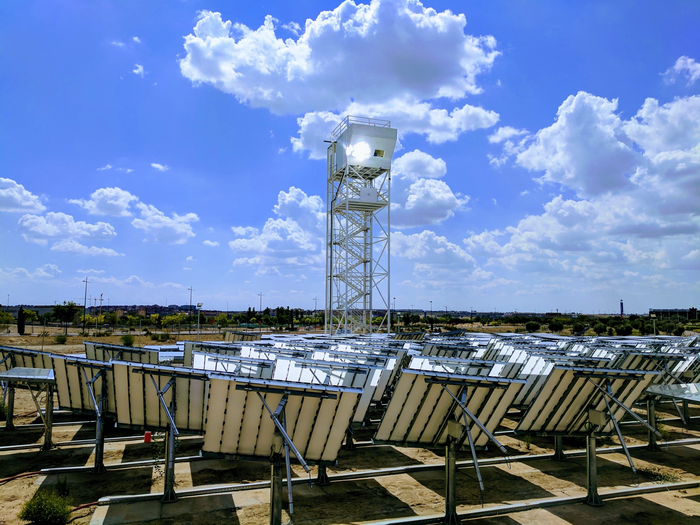Scientists have built an aviation fuel production system that uses water, carbon dioxide (CO2), and sunlight. They have put the system into action, and the design, which was published on July 20th, 2022, in the journal Joule, might help the aviation industry on its journey to becoming carbon-free.
 Solar tower fuel plant during operation. Image Credit: IMDEA Energy
Solar tower fuel plant during operation. Image Credit: IMDEA Energy
We are the first to demonstrate the entire thermochemical process chain from water and CO2 to kerosene in a fully-integrated solar tower system.
Aldo Steinfeld, Professor, Study Corresponding Author, ETH Zurich
Earlier efforts to generate aviation fuels using solar energy have mostly been carried out in the laboratory.
The aviation industry is responsible for approximately 5% of global anthropogenic emissions that cause climate change. It is heavily reliant on kerosene, also known as jet fuel, which is a liquid hydrocarbon fuel derived primarily from crude oil. At the moment, there are no clean options available to power long-haul commercial flights on a global scale.
“With our solar technology, we have shown that we can produce synthetic kerosene from water and CO2 instead of deriving it from fossil fuels. The amount of CO2 emitted during kerosene combustion in a jet engine equals that consumed during its production in the solar plant,” Steinfeld says. “That makes the fuel carbon neutral, especially if we use CO2 captured directly from the air as an ingredient, hopefully in the not-too-distant future.”
Steinfeld and his colleagues proposed a system that uses solar energy to generate drop-in fuels, which are synthetic options for fossil-derived fuels like kerosene and diesel, as part of the European Union’s SUN-to-LIQUID project.
According to Steinfeld, solar-produced kerosene is fully consistent with current aviation infrastructure for fuel storage, allocation, and use in jet engines. He adds that it can also be merged with fossil-derived kerosene.
In 2017, the team began scaling up the design and construction of a solar fuel manufacturing plant at the IMDEA Energy Institute in Spain. The plant is made up of 169 sun-tracking reflective panels that redirect and concentrate solar radiation into a tower-mounted solar reactor. The concentrated solar energy then powers oxidation-reduction (redox) reaction cycles in the solar reactor’s porous ceria structure.
The ceria, which is not absorbed but can be reused, transforms the water and CO2 injected into the reactor into syngas, a customized mixture of hydrogen and carbon monoxide. Syngas is then fed into a gas-to-liquid converter, where it is converted into liquid hydrocarbon fuels such as kerosene and diesel.
This solar tower fuel plant was operated with a setup relevant to industrial implementation, setting a technological milestone towards the production of sustainable aviation fuels.
Aldo Steinfeld, Professor, Study Corresponding Author, ETH Zurich
The solar reactor’s energy efficiency — the portion of solar energy input that is transformed into the total energy of the syngas produced — was approximately 4% during a nine-day run of the plant reported in the paper.
Steinfeld claims that his team is working hard to improve the design to increase efficiency to values greater than 15%. For instance, they are investigating ways to optimize the ceria structure for solar radiation absorption and developing techniques to recover the heat generated during redox cycles.
Journal Reference:
Zoller, S., et al. (2022) A solar tower fuel plant for the thermochemical production of kerosene from H2O and CO2. Joule. doi.org/10.1016/j.joule.2022.06.012.